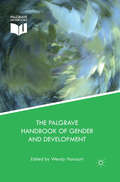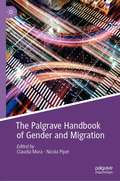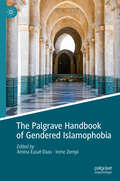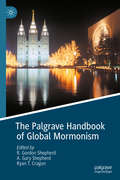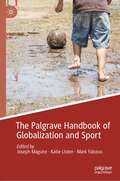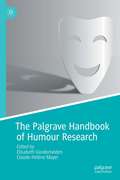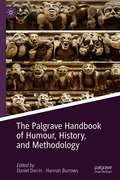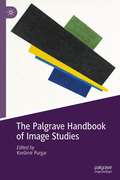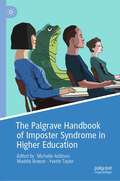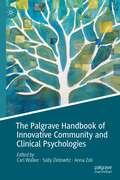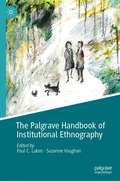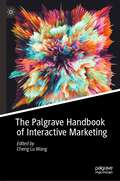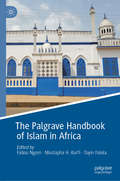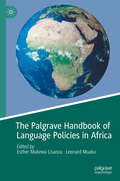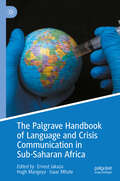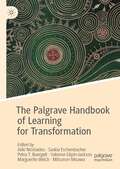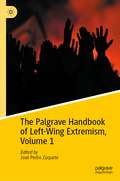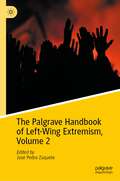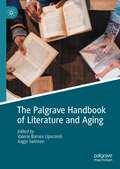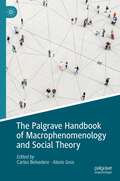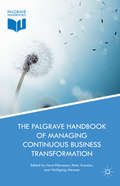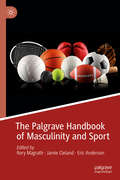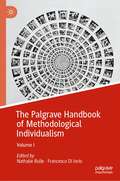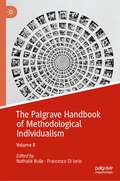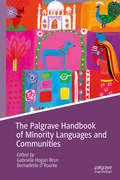- Table View
- List View
The Palgrave Handbook of Gender and Development: Critical Engagements in Feminist Theory and Practice
by Wendy HarcourtWith original and engaging contributions, this Handbook confirms feminist scholarship in development studies as a vibrant research field. It reveals the diverse ways that feminist theory and practice inform and shape gender analysis and development policies, bridging generations of feminists from different institutions, disciplines and regions.
The Palgrave Handbook of Gender and Migration
by Nicola Piper Claudia MoraThis handbook adopts a distinctively global and intersectional approach to gender and migration, as social class, race and ethnicity shape the process of migration in its multiple dimensions. A large range of topics exploring gender, sexuality and migration are presented, including feminist migration research, care, family, emotional labour, brain drain and gender, parenting, gendered geographies of power, modern slavery, women and refugee law, masculinities, and more. Scholars from North and South America, Europe, Asia, and Oceania delve into institutional, normative, and day-to-day practices conditioning migrants´ rights, opportunities and life chances based on material from around the world. This handbook will be of great interest to students and scholars across a range of disciplines, including Women’s and Gender Studies, Sociology, Sexuality Studies, Migration Studies, Politics, Social Policy, Public Policy, and Area Studies.
The Palgrave Handbook of Gendered Islamophobia
by Irene Zempi Amina Easat-DaasAgainst a backdrop of continually growing global Islamophobia, this handbook provides a comprehensive, interdisciplinary overview of the key issues, theories, debates, and developments in gendered Islamophobia, unpacking how Western, Orientalist constructions of Muslim men and women affect the lived experiences of Muslim men and women; impact social, legal, and criminological policies, practices, and discourse; and give rise to resistance against gendered Islamophobia. Drawing on theories from philosophy, sociology, gender studies, psychology and criminology, sections examine the interdisciplinary theoretical dimensions of gendered Islamophobia; illustrate the dynamics of gendered Islamophobia through the use of case examples in the UK, Europe, North America, Australasia, the Middle East, and South Asia. This handbook will be valuable reading for scholars, researchers, and policymakers around the globe in Gender Studies, Sociology, Criminology, Politics, and Law, whofocus on the intersections of gender and Islamopobia, and the impact on Muslim men and women respectively.
The Palgrave Handbook of Global Mormonism
by R. Gordon Shepherd A. Gary Shepherd Ryan T. CragunThis handbook explores contemporary Mormonism within a global context. The authors provide a nuanced picture of a historically American religion in the throes of the same kinds of global change that virtually every conservative faith tradition faces today. They explain where and how the Church of Jesus Christ of Latter-day Saints has penetrated national and cultural boundaries in Latin America, Oceania, Europe, Asia, and Africa, as well as in North America beyond the borders of Mormon Utah. They also address numerous concerns within a multinational, multicultural church: What does it mean to be a Latter-day Saint in different world regions? What is the faith’s appeal to converts in these places? What are the peculiar problems for members who must manage Mormon identities in conjunction with their different national, cultural, and ethnic identities? How are leaders dealing with such issues as the status of women in a patriarchal church, the treatment of LGBTQ members, increasing disaffiliation of young people, and decreasing growth rates in North and Latin America while sustaining increasing growth in parts of Asia and Africa?
The Palgrave Handbook of Globalization and Sport
by Joseph Maguire Mark Falcous Katie ListonThis handbook illustrates the utility of global sport as a lens through which to disentangle the interconnected political, economic, cultural, and social patterns that shape our lives. Drawing on multidisciplinary perspectives, it is organized into three parts. The first part outlines theoretical and conceptual insights from global sport scholarship: from the conceptualization and development of globalization theories, transnationalism and transnational capital, through to mediasport, roving coloniality, and neoliberal doctrine. The second part illustrates the varied flows within global sport and the ways in which these flows are contested, across physical cultures/sport forms, identities, ideologies, media, and economic capital. Diverse topics and cases are covered, such as sport business and the global sport industry, financial fair play, and global mediasport. Finally, the third part explores various aspects of global sport development and governance, incorporating insights from work in the Global South. Across all of these contributions, varied approaches are taken to examine the ‘power of sport’ trope, generating a thought-provoking dialogue for the reader. Featuring an accomplished roster of contributors and wide-ranging coverage of key issues and debates, this handbook will serve as an indispensable resource for scholars and students of contemporary sports studies.
The Palgrave Handbook of Humour Research
by Elisabeth Vanderheiden Claude-Hélène MayerThis Handbook provides new perspectives on humour from transdisciplinary perspectives. It focuses on humour as a resource from different socio-cultural and psychological viewpoints and brings together authors from different cultures, social contexts and countries.The book will enable researchers and practitioners alike to unlock new research findings which give new directions for contemporary and future humour research. By employing transdisciplinary and transcultural perspectives, the volume further discusses humour in regard to different cultural and political contexts, humour over the lifespan, in therapy and counselling, in pedagogical settings, in medicine and the workspace. The contributions also highlight the connections between humour and the COVID-19 pandemic and promise new inspiring insights. Researchers, practitioners and students in the fields of industrial and organisational psychology, positive psychology, organisational studies, future studies, health and occupational science and therapy, emotion sciences, management, leadership and human resource management will find the contributions highly topical, insightful and applicable to practice.
The Palgrave Handbook of Humour, History, and Methodology
by Daniel Derrin Hannah BurrowsThis handbook addresses the methodological problems and theoretical challenges that arise in attempting to understand and represent humour in specific historical contexts across cultural history. It explores problems involved in applying modern theories of humour to historically-distant contexts of humour and points to the importance of recognising the divergent assumptions made by different academic disciplines when approaching the topic. It explores problems of terminology, identification, classification, subjectivity of viewpoint, and the coherence of the object of study. It addresses specific theories, together with the needs of specific historical case-studies, as well as some of the challenges of presenting historical humour to contemporary audiences through translation and curation. In this way, the handbook aims to encourage a fresh exploration of methodological problems involved in studying the various significances both of the history of humour and of humour in history.
The Palgrave Handbook of Image Studies
by Krešimir PurgarThis handbook brings together the most current and hotly debated topics in studies about images today. In the first part, the book gives readers an historical overview and basic diacronical explanation of the term image, including the ways it has been used in different periods throughout history. In the second part, the fundamental concepts that have to be mastered should one wish to enter into the emerging field of Image Studies are explained. In the third part, readers will find analysis of the most common subjects and topics pertaining to images. In the fourth part, the book explains how existing disciplines relate to Image Studies and how this new scholarly field may be constructed using both old and new approaches and insights. The fifth chapter is dedicated to contemporary thinkers and is the first time that theses of the most prominent scholars of Image Studies are critically analyzed and presented in one place.
The Palgrave Handbook of Imposter Syndrome in Higher Education
by Michelle Addison Yvette Taylor Maddie BreezeThis handbook explores feeling like an ‘imposter’ in higher education and what this can tell us about contemporary educational inequalities. Asking why imposter syndrome matters now, we investigate experiences of imposter syndrome across social locations, institutional positions, and intersecting inequalities. Our collection queries advice to fit-in with the university, and authors reflect on (not)belonging in, with and against educational institutions. The collection advances understandings of imposter syndrome as socially situated, in relation to entrenched inequalities and their recirculation in higher education. Chapters combine creative methods and linger on the figure of the ‘imposter’ - wary of both individualising and celebrating imposters as lucky, misfits, fraudsters, or failures, and critically interrogating the supposed universality of imposter syndrome.
The Palgrave Handbook of Innovative Community and Clinical Psychologies
by Carl Walker Sally Zlotowitz Anna ZoliThis handbook highlights a range of ground breaking, radical and liberatory clinical and critical community psychology projects from around the world. The disciplines of critical community psychology and clinical psychology are currently experiencing radical innovations that in this book are characterised as moving from the individualising practice realm toward an altogether more contextualising orientation. Both fields are responding to an array of political, social and economic injustices and a global political context. Community and clinical psychologists have found themselves reorienting their practice to confront, resist and subvert the structures that are so damaging to the lives of the vulnerable people they work with. This text posits that these approaches refute and resist the psychologising that has strengthened oppressive structures. Such practices are starting to engage in the political character of power-knowledge relationships that demand a more ‘action-oriented’ and less ‘clinical’ psychology praxis and there is a growing interest in, and commitment to, social justice in the field of mental wellbeing. Using examples of scholar, activist and practitioner work from around the world, this collection explores and documents those practices where the traditional remits of community and clinical psychology have been subverted, altered, stretched, changed and reworked in order to reframe practice around human rights, creativity, political activism, social change, space and place, systemic violence, community transformation, resource allocation and radical practices of disruption and direct action.
The Palgrave Handbook of Institutional Ethnography
by Paul C. Luken Suzanne VaughanA comprehensive guide to the alternative sociology originating in the work of Dorothy E. Smith, this Handbook not only explores the basic, founding principles of institutional ethnography (IE), but also captures current developments, approaches, and debates. Now widely known as a “sociology for people,” IE offers the tools to uncover the social relations shaping the everyday world in which we live and is utilized by scholars and social activists in sociology and beyond, including such fields as education, nursing, social work, linguistics, health and medical care, environmental studies, and other social-service related fields. Covering the theoretical and methodological underpinnings of IE, recent developments, and current areas of research and application that have yet to appear in the literature, The Palgrave Handbook of Institutional Ethnography is suitable for both experienced practitioners of institutional ethnography and those who are exploring this approach for the first time.
The Palgrave Handbook of Interactive Marketing
by Cheng Lu WangInteractive marketing, as one of the fastest growing academic fields in contemporary business world, is the multi-directional value creation and mutual-influence marketing process through active customer connection, engagement, participation and interaction. Contemporary interactive marketing has moved beyond the scope of direct marketing or digital marketing, as the market is becoming a forum for conversations and interactions among connected actors or participants in platform ecosystems. The advancement of mobile technology with interactive content and personalized experience makes interactive marketing the new normal in the business world.This handbook contains the most comprehensive and cutting-edge knowledge in the interactive marketing field. The 41 chapters that are divided into eight sections cover all aspects of contemporary interactive marketing realm, including social media and influencer marketing, big data and machine learning in predictive analytics, mobile marketing and proximity marketing, interactive digital marketing and Omnichannel marketing, AI, VR and AR in business applications. With a focal point on interactive marketing, this handbook takes a multidiscipline perspective, from new technology innovations, social media and platform application, economic and cultural impacts, social and psychological analysis, and management and information system. This book provides a timely and comprehensive textbook companion and/or course project resource for college educators and students used for variety of graduate and undergraduate marketing courses, such as Digital Marketing, Internet Marketing, Social Media Marketing, New Media Communication, Marketing Analytics and Marketing Management, etc. It offers valuable references for academic researchers who are interesting conducting and publishing in interactive marketing research. The state-of-art review and emerging new trends presented in the book are particularly useful for research idea generation and conceptual development. The book also putts forward insightful guidelines and practical tools for business management in the application of new interactive marketing strategies and applications in the real world practices.
The Palgrave Handbook of Islam in Africa
by Toyin Falola Fallou Ngom Mustapha H. KurfiThis handbook generates new insights that enrich our understanding of the history of Islam in Africa and the diverse experiences and expressions of the faith on the continent. The chapters in the volume cover key themes that reflect the preoccupations and realities of many African Muslims. They provide readers access to a comprehensive treatment of the past and current traditions of Muslims in Africa, offering insights on different forms of Islamization that have taken place in several regions, local responses to Islamization, Islam in colonial and post-colonial Africa, and the varied forms of Jihād movements that have occurred on the continent. The handbook provides updated knowledge on various social, cultural, linguistic, political, artistic, educational, and intellectual aspects of the encounter between Islam and African societies reflected in the lived experiences of African Muslims and the corpus of African Islamic texts.
The Palgrave Handbook of Language Policies in Africa
by Esther Mukewa Lisanza Leonard MuakaThis handbook explores language policies and their impacts in Africa, examining the different language policies in each country from pre-colonial to post-colonial times. Most African countries are multilingual, apart from a handful which are said to be quasi-monolingual. The authors in this handbook investigate language policy in education, media, legal courts, government documents and other public domains, and show how these policies shape learning and delivery of services to the citizens. The volume also pays special attention to the roles assigned to minority languages in Africa, most of which are endangered. The contributions also investigate how these language policies are influenced by the history of colonialism and language attitudes emanating from colonial rule. This handbook will be of interest to a diverse audience of readers, including those interested in African languages, language planning and policy, and African history and education.
The Palgrave Handbook of Language and Crisis Communication in Sub-Saharan Africa
by Hugh Mangeya Isaac Mhute Ernest JakazaThis handbook provides a detailed and sustained examination of the scope, purpose and practical application of crisis and disaster management communication in this critical region of the African continent, sub-Saharan Africa (SSA). The volume lays the foundation that enables a nuanced appreciation of two significant issues. The first pertains to SSA’s vulnerability to both natural and man-made phenomena. Secondly, it argues that communication plays a critical role in so far as the identification, social construction, raising awareness, preparation, mitigation and eradication of crises and disasters in the region. Communication plays a critical role in potentially reducing the impacts of crises and disasters before their occurrence. This handbook is a key resource for academics, students and practitioners in areas such as political communication, media communication, language and communication, brand communication, social/digital media communication, and crisis communication, among others.
The Palgrave Handbook of Learning for Transformation
by Aliki Nicolaides Saskia Eschenbacher Petra T. Buergelt Yabome Gilpin-Jackson Marguerite Welch Mitsunori MisawaThis handbook offers an expanded discourse on transformative learning by making the turn into new passageways to explore the phenomenon of transformation. It curates diverse discourses, knowledges and practices of transformation, in ways that both includes and departs from the adult learning mainstay of transformative learning and adult education. The purpose of this handbook is not to resolve or unify a theory of transformation and all the disciplinary contributions that clearly promote a living concept of transformation. Instead, the intent is to catalyze a more complex and deeper inquiry into the “Why of transformation.” Each discipline, culture, ethics and practice has its own specialized care and reasons for paying attention to transformation. How can scholars, practitioners, and active members of discourses on transformative learning make a difference? How can they foster and create conditions that allow us to move on to other, unaddressed or understudied questions? To answer these questions, the editors and their authors employ the metaphor of the many turns into passageways to convey the potential of transformation that may emerge from the many connecting passageways between, for instance, people and society, theory and practice, knowledge created by diverse disciplines and fields/professions, individual and collective transformations, and individual and social action.
The Palgrave Handbook of Left-Wing Extremism, Volume 1
by José Pedro ZúqueteThis handbook provides a broad overview of left-wing extremism and its associated key issues and themes. It breaks new ground by assembling in a single volume a comparative analysis of the phenomenon that is both multidimensional and multidisciplinary. Gathering a wide range of influential scholars who have worked at length in the field of extremism studies from different perspectives, backgrounds, and geographical settings, the Palgrave Handbook of Left-Wing Extremism presents an array of thought-provoking and innovative as well as informative analyses and discussions – both historical and contemporary - about the phenomenon of left-wing extremism and of how researchers conceive of and approach it in their study. The Handbook is designed to be, for the foreseeable future, the reference work for all students, researchers, and general readers interested in achieving a comprehensive understanding of left-wing extremism in all its manifestations, subtleties, and dynamics, and both its current and its potential directions.
The Palgrave Handbook of Left-Wing Extremism, Volume 2
by José Pedro ZúqueteThis handbook provides a broad overview of left-wing extremism and its associated key issues and themes. It breaks new ground by assembling a comparative analysis of the phenomenon that is both multidimensional and multidisciplinary. Gathering a wide range of influential scholars who have worked at length in the field of extremism studies from different perspectives, backgrounds, and geographical settings, the Palgrave Handbook of Left-Wing Extremism presents an array of thought-provoking and innovative as well as informative analyses and discussions – both historical and contemporary - about the phenomenon of left-wing extremism and of how researchers conceive of and approach it in their study. The Handbook is designed to be, for the foreseeable future, the reference work for all students, researchers, and general readers interested in achieving a comprehensive understanding of left-wing extremism in all its manifestations, subtleties, and dynamics, and both its current and its potential directions.
The Palgrave Handbook of Literature and Aging
by Valerie Barnes Lipscomb Aagje SwinnenThis handbook offers a comprehensive survey of the growing field of literary age studies and points to new directions in scholarly research. Divided into four sections, the volume reflects the current conversations in the field: intersections and intersectionalities, traveling concepts, methodological innovations, and archival inquiries. It encompasses the spectrum of critical approaches that literary age studies scholars employ, from environmental studies and postcolonial theory to critical race theory and queer studies. While close reading continues to be a mainstay of literary criticism, the handbook highlights alternative tools and routes in both data elicitation and analysis. The final part of the book shows the burgeoning interest in the field from literary scholars across historical periods, extending the scope of literary age studies beyond contemporary texts. This is an essential reference work for advanced students and scholars of literary studies, gerontology, age/aging studies, interdisciplinary studies and cultural studies.
The Palgrave Handbook of Macrophenomenology and Social Theory
by Carlos Belvedere Alexis GrosThis Palgrave Handbook showcases how the phenomenological approach, especially but not only as developed by Alfred Schutz, can make important contributions to the theoretical analysis of macro-social phenomena such as the state, history, culture and interculturality, class relations and struggles, social movements and protests, capitalism, democracy, and digitalization processes. It gathers systematically and intellectual-historically oriented chapters that deal with these macro social phenomena from a phenomenological perspective. This handbook is mainly intended for a threefold audience: sociologists and social scientists at large – both theoretically and empirically oriented –, phenomenological sociologists, and phenomenological philosophers. This book includes chapters by international renowned specialists in social theory, phenomenological sociology, and phenomenology: Hartmut Rosa (University of Jena), Michael Barber (St. Louis University), Thomas Eberle (University of St. Gallen), Roberto Walton (Universidad de Buenos Aires), Jochen Dreher (University of Konstanz), Chung-Chi YU (National Sun Yat-sen University, Taiwan), and George Bondor (AI.I. Cuza University of Iasi, Romania), among others.
The Palgrave Handbook of Managing Continuous Business Transformation
by Peter Kreutter Wolfgang Messner Horst EllermannThis handbook provides a comprehensive and unparalleled reference point for studying continuous business transformation. Asserting that change will be the new normal and highlighting the fact that business transformation can never be complete, this important resource is a tool for coping with ongoing change in order to become and stay resilient, the predominant concern of executives across industries. Containing case study material to illustrate issues and solutions, The Palgrave Handbook of Managing Continuous Business Transformation takes an interdisciplinary approach weaving together strategic concepts with real-life experiences, connecting human resource issues with shifts in information technology and linking customers with the businesses from which they buy. Structured into four parts; transformational shifts, achieving customer centricity, dealing with new technology and leading the change, this handbook is crucial reading for academics, scholars and practitioners of business transformation.
The Palgrave Handbook of Masculinity and Sport
by Eric Anderson Jamie Cleland Rory MagrathOver the past two decades there has been a rapid transformation of masculinities in the West, largely facilitated by a decline in cultural homophobia. The significant changes in the expression of masculinity, particularly among younger generations of men, have been particularly evident in men’s team sports, which have become an increasingly diverse and inclusive culture. Drawing upon work from a wide range of established and emerging international scholars, this handbook provides a comprehensive and interdisciplinary analysis of the contemporary relationship between masculinity and sport. It covers a range of areas including history, media, gender, sexuality, race, violence, and fandom, considering how they impact a range of different sports across the world. Students and scholars across many disciplines will find the unparalleled overview provided by these specially commissioned chapters an invaluable resource.
The Palgrave Handbook of Methodological Individualism: Volume I
by Francesco Di Iorio Nathalie BulleWhile methodological individualism is a fundamental approach within the social sciences, it is often misunderstood. This highlights the need for a discursive and up-to-date reference work analyzing this approach’s classic arguments and assumptions in the light of contemporary issues in sociology, economics and philosophy. This two-volume handbook presents the first comprehensive overview of methodological individualism. Chapters discuss historical and contemporary debates surrounding this central approach within the social sciences, as well as cutting edge developments related to the individualist tradition with philosophical and scientific implications. Bringing together multiple contributions from the world’s leading experts on this important tradition of theorizing, this collective endeavor provides teachers, researchers and students in sociology, economics, and philosophy with a reliable and critical understanding of the founding principles, key thinkers and intellectual development of MI since the late 19th century.
The Palgrave Handbook of Methodological Individualism: Volume II
by Francesco Di Iorio Nathalie BulleWhile methodological individualism is a fundamental approach within the social sciences, it is often misunderstood. This highlights the need for a discursive and up-to-date reference work analyzing this approach’s classic arguments and assumptions in the light of contemporary issues in sociology, economics and philosophy. This two-volume handbook presents the first comprehensive overview of methodological individualism. Chapters discuss historical and contemporary debates surrounding this central approach within the social sciences, as well as cutting edge developments related to the individualist tradition with philosophical and scientific implications. Bringing together multiple contributions from the world’s leading experts on this important tradition of theorizing, this collective endeavor provides teachers, researchers and students in sociology, economics, and philosophy with a reliable and critical understanding of the founding principles, key thinkers and intellectual development of MI since the late 19th century.
The Palgrave Handbook of Minority Languages and Communities
by Gabrielle Hogan-Brun Bernadette O’RourkeThis Handbook is an in-depth appraisal of the field of minority languages and communities today. It presents a wide-ranging, coherent picture of the main topics, with key contributions from international specialists in sociolinguistics, policy studies, sociology, anthropology and law. Individual chapters are grouped together in themes, covering regional, non-territorial and migratory language settings across the world. It is the essential reference work for specialist researchers, scholars in ancillary disciplines, research and coursework students, public agencies and anyone interested in language diversity, multilingualism and migration.
